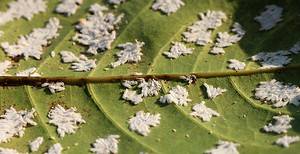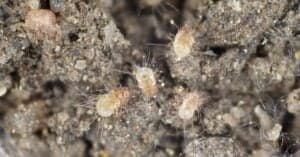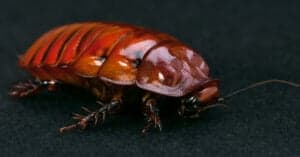Mosquitoes may be annoying, particularly when the hot summer months roll around and their buzzing is everywhere. But why do these critters even exist? With more than 3000 species of mosquitoes present around the globe, they serve a greater purpose than being irritating.
Not only do mosquitoes provide food for larger animals like birds and bats, but they also help spread pollen from one place to another. Plus, they are a vital source of sustenance for aquatic creatures. Unfortunately, mosquitoes can also be dangerous – they are known to carry serious diseases such as malaria, dengue fever, and the Zika virus.
Although we may not be thrilled about having these creatures around, it is crucial to acknowledge their unique role in the world’s ecosystems. Understanding the facts about mosquitoes can help us better appreciate their purpose and value in nature.
Why Do Mosquitoes Exist in the Ecosystem?
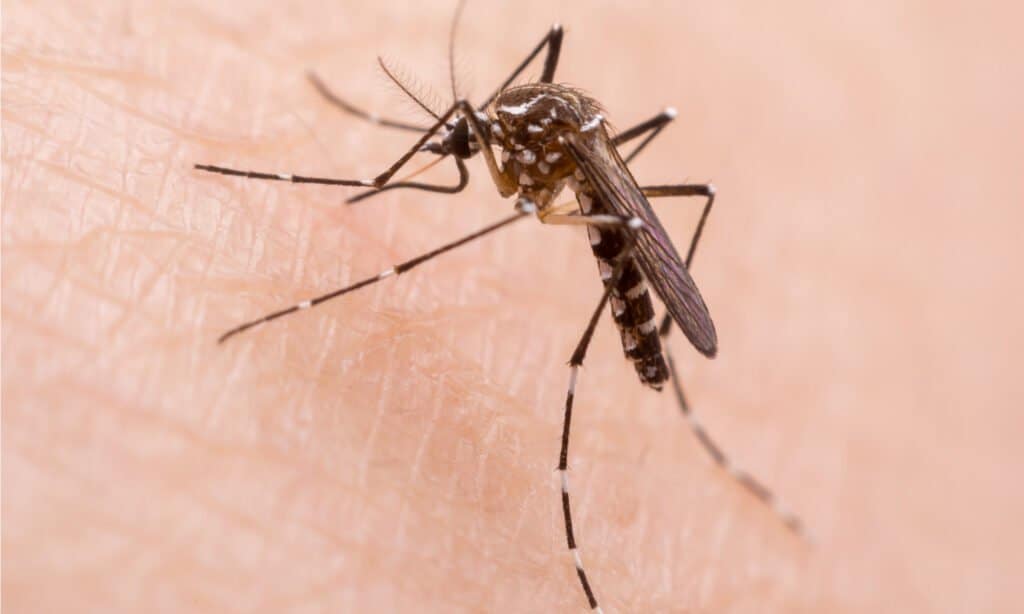
Mosquitoes are an essential part of the ecosystem.
©Surachai Pung/Shutterstock.com
Mosquitoes are a necessary part of the environment and play an important role in maintaining the balance of nature. Here are ways mosquitoes contribute to the ecosystem.
Mosquitoes Help With Pollination
Did you know that mosquitoes play an important role in pollination? Not only bees and birds assist in pollination, but these bugs play a significant role in pollination because their primary food source is nectar and not blood. Yes, you read that right. Male mosquitoes only feed on nectar from flowers and do not bite humans. The female mosquito only bites and feeds on blood when laying eggs to obtain protein.
As mosquitoes move from one flower to the next, feeding on nectar, they help to transfer pollen among different flowers, thereby leading to pollination. As a result, fertilization occurs in the plants, seeds are formed, and the plants reproduce.
Mosquitoes are just as crucial as butterflies and bees in pollination. However, few plants depend exclusively on mosquitoes for pollination. The majority of plants can still thrive in case mosquitoes become extinct. On the other hand, orchids such as the Blunt Leaved Bog Orchid, also known as Platanthera obtusata, rely only on mosquitoes and moths for pollination.
Other Animals Feed on Mosquitoes
Mosquitoes are a critical element of the food chain in the animal kingdom. Although most humans may despise mosquitoes, thousands of animals enjoy feeding on mosquitoes. Some of the animals that consume mosquitoes include:
- Birds
- Bats
- Mammals
- Dragonflies
- Lizards
- Turtles
Mosquito larvae thrive in water habitats, where fish and other marine creatures find and feed on the larvae. Moreover, mosquitoes are essential prey to wildlife species that depend on tiny flying insects as a source of food. Sure, it’s rare to find an animal species that only feeds on mosquitoes, but clearly, mosquitoes have a purpose in the food chain of the animal kingdom.
What Would Happen if Mosquitoes Became Extinct?
As discussed earlier, you’ve probably wondered why mosquitoes exist and have imagined a world where mosquitoes are extinct. You could spend your entire day relaxing by the lakeside without having to swat any pesky mosquito. Also, sleeping with your windows open at night without mosquitoes buzzing in your ear and biting your skin wouldn’t be a problem.
The extinction of mosquitoes seems more convenient to human beings. What about the rest of the ecosystem? Here are some of the things that could happen if mosquitoes disappeared.
Slight Changes in the Food Chain
Even though there would be ecosystem changes after the mosquitoes’ extinction, the ecosystem would not collapse. Chances are high that the void niche left by mosquitoes would eventually be replaced with other species. However, marine species that feed exclusively on mosquitoes, e.g., the mosquitofish, are highly likely to become extinct due to lack of food.
Terrestrial animal species that feed on mosquitoes would rely on alternative food sources to avoid starving. This change might result in a cascade effect on all food chains in connected habitats.
For instance, to replace mosquitoes, birds, lizards, and frogs might opt to feed on other insects, such as honey bees, which are also pollinators. If the number of honey bee species decreased over the years, the pollination rate would also decrease, which could mean less plant produce and less food for humans. Of course, humankind is not ready for such a scenario.
Also, what if mosquitoes are replaced by a more menacing predator instead of being replaced by another prey? Scientists have been unable to study mosquitoes extensively, so there might be untold consequences if mosquitoes ever became extinct.
Eradication of Some Diseases
On the bright side, however, if mosquitoes became extinct, diseases like malaria would disappear, and saving millions of lives yearly. Mosquito-borne diseases have overwhelmed some countries worldwide due to the high treatment costs. If mosquito-borne diseases were eradicated, the resources used to treat the illnesses would be used to deal with other global challenges like hunger and famine.
Are All Mosquitoes Deadly?
When you hear of a deadly animal, you picture a shark or a lion in your mind. Due to the tiny nature of a mosquito, it’s almost impossible to consider mosquitoes as deadly animals. However, mosquitoes are some of the most harmful insects in the world, according to the Department Of Public Health in Illinois. Mosquitoes kill about 2-3 million people annually around the globe by spreading malaria.
Only the female mosquito is responsible for spreading diseases among humans. Male mosquitoes cannot bite because their mouths cannot pierce human or animal skin. So, female mosquitoes are the most dangerous of the species.
In addition to spreading malaria, mosquitoes also spread other viral diseases, such as dengue fever. Dengue fever is common in people traveling from South Central Asia, the Caribbean, South America, and Central America. Mosquitoes infected with the dengue virus spread the disease through biting instead of transferring it from one infected person to another.
Other diseases spread by mosquitoes include:
- Zika
- Heartworm disease
- West Nile virus
- Tularemia
- St. Louis Encephalitis
Mosquitoes are among the most deadly insects on earth due to their ability to transmit life-threatening diseases to humans.
Other Interesting Mosquito Facts
Understanding more details about mosquitoes, such as what they are drawn to, why they bite people, and why mosquitoes exist, may help you protect your entire family from these deadly insects. Here are additional facts about mosquitoes.
Mosquitoes Are Attracted to a Specific Blood Group
Have you ever gone camping with a group of friends, and one of them seemed to be a target for most mosquitoes? Research shows about 20% of humans are magnets for mosquitoes. Even though scientists haven’t discovered why mosquitoes are likely to bite other people more than others, they believe that blood type plays a role. People with blood type O are more likely to be a target for mosquitoes than other blood types.
You’re Allergic to Mosquito Saliva
Mosquito bites tend to be very itchy because you’re allergic to mosquito saliva. When the mosquito bites you, it doesn’t just feed on your blood. The mosquito deposits its saliva into your skin. The foreign deposited matter in your skin triggers your immune system to respond, producing an itching sensation, swelling, and redness.
Mosquitoes Can Breed in a Tiny Pool of Water
Mosquitoes can lay their eggs on wet ground or in stagnant water. A mosquito can breed successfully in water as little as a teaspoonful. If you’ve any bottle caps, old tires, saucers, or birdbaths in your backyard, we suggest removing them immediately.
Also, remove or cover up any standing waters near your home because they might provide mosquitoes with a cozy breeding habitat.
Mosquitoes Are Attracted to Carbon Dioxide
Carbon dioxide is very attractive and addictive to mosquitoes. One of the reasons mosquitoes can locate you in the dark is your breath. They are drawn to the smell of the carbon dioxide you release every time you breathe.
Mosquitoes have a maxillary palp, an organ they use to detect carbon dioxide in the air.
Mosquitoes Have Existed for Centuries
Scientists believe that mosquitoes have existed for the past 226 million years. However, even though mosquitoes are old, they have a short life span. The life cycle of an average mosquito from egg to adult stage is 7-10 days. The average lifespan of an adult mosquito is ten days for males and 42-56 days for females.
Preventative Measures Against Mosquitoes
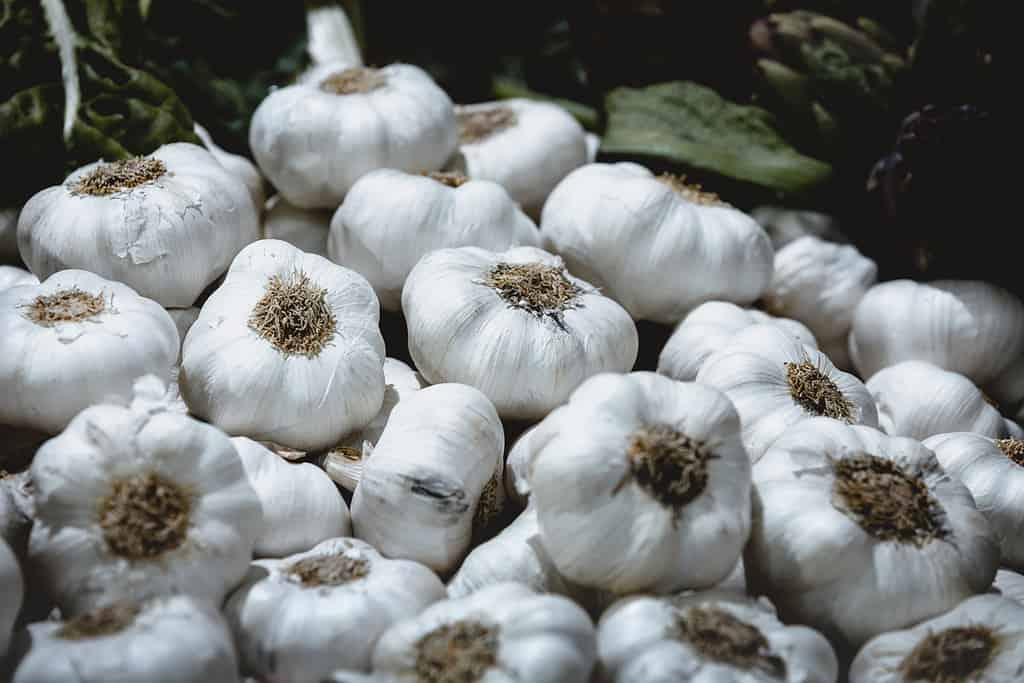
Use garlic and water to make a mosquito repellant spray.
©Carl.Salisbury/Shutterstock.com
Do you live in an area infested by mosquitoes? By now, you know how deadly mosquitoes can be when they transfer diseases like malaria, dengue fever, and yellow fever to people. Luckily, there are various preventative measures to ensure you and your family are safe from mosquitoes. They include:
Using Mosquito Repellent
You can spray many mosquito repellent products around your home to eliminate mosquitoes. Chemical repellents will instantly destroy mosquitoes. For instance, you can purchase mosquito-repellent devices that emit liquid chemicals into the air to repel mosquitoes. Alternatively, you can opt for the spray-on bug mosquito repellent to destroy mosquitoes in your room.
However, chemical products may also harm you and the environment. Think about it. What if you have a child that is younger than 3 years old and find mosquitoes in their room? Spraying the chemical repellents in their room at night might affect your child’s overall health in the long haul.
Instead of using chemicals, you can use the following natural organic mosquito repellents:
Camphor
Camphor is an aromatic substance that people rub on their chests to open up their nasal passages when dealing with a cold. Its strong smell is effective in repelling mosquitoes.
We recommend buying the camphor version that you can quickly burn. Light up the camphor in a room for about 30 minutes after closing the windows and rooms. All the mosquitoes will disappear.
Garlic
Mosquitoes dislike the sulfur component in garlic. If you spray a mosquito with garlic juice, it will die. Therefore, if you want to get rid of mosquitoes in your apartment, we suggest crushing several garlic cloves and boiling them in water.
You can place the solution in a bottle and spray the garlic water around your house. The garlic scent will keep mosquitoes away. Any mosquito that comes into contact with the spray water will die instantly.
Coffee Grounds
Another simple item in your kitchen that you can use to get rid of mosquitoes is coffee. Just place coffee grounds in stagnant water around your home and watch how quickly you destroy the mosquitoes’ breeding habitat.
The coffee grounds will absorb oxygen from the water, causing the mosquito eggs to float to the surface and perish due to lack of oxygen. Coffee grounds are great for stagnant water that you cannot get rid of.
Inspect Your Gutters
You might’ve removed every possible natural breeding ground for mosquitoes from your property, but if you don’t check your gutters, you won’t get rid of the mosquitoes completely. Your gutters could have debris that causes water to collect in puddles, providing mosquitoes with a breeding ground.
We advise cleaning your gutters at least twice a year to fix any issues that may cause water to collect in them.
Fill In Dips Around Your Home
If your landscape has several depressions or ditches, they could provide mosquitoes with a breeding ground after it rains and water collects in the dips. You can consult a landscaper on how to level your land or use gravel or topsoil to cover the depressions. All it takes is a tiny pool of water for Malaria-borne mosquitoes to breed.
Drill Holes in Garbage Cans
Another simple way to get rid of breeding grounds in hidden areas is to drill holes in your garbage cans. Sometimes water collects at the bottom of your trash cans and may provide mosquitoes with a breeding ground without your knowledge.
By drilling tiny holes at the bottom of the trashcan, you ensure that any water that collects at the bottom will drain out. Not only will you get rid of mosquitoes, but you will also get rid of the putrid smell that the garbage water produces when it accumulates at the bottom.
Cover Rain Barrels or Water Tanks
If you’ve any cans containing water on your property, cover them. Mosquitoes don’t breed in dirty pools of water only. Mosquitoes prefer to produce in clean water. Therefore, cover up any containers that contain water with a lid or screen to prevent mosquitoes from contaminating the water.
Do Mosquitoes Have a Purpose?
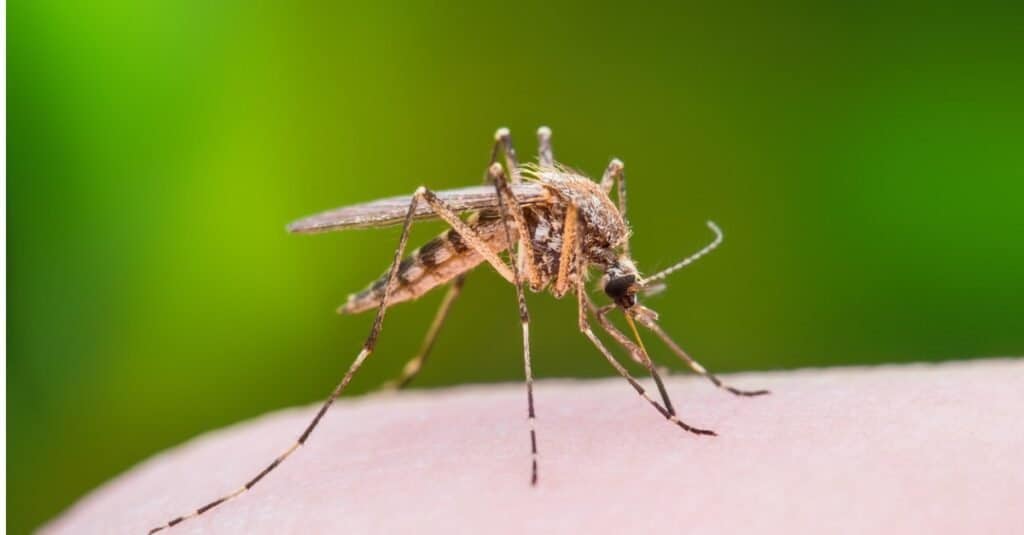
Mosquitoes are annoying but why do they exist? There are many reasons.
©iStock.com/nechaev-kon
Although mosquitoes can transmit harmful diseases to people, they have their role in the ecosystem. So, why do mosquitoes exist? Mosquitoes exist to help in pollination when they feed on nectar in flowers. Some birds, reptiles, and fish also feed on mosquitoes, making them useful in the food chain.
Although there are thousands of mosquito species on earth, only 100 bite people and transmit diseases. The majority of mosquitoes are harmless to people and animals. However, mosquitoes are vectors of deadly diseases like malaria and should be avoided at all costs. We recommend carrying out the preventative measures above to keep your home safe from mosquitoes.
Use natural mosquito repellent if you dislike chemicals. Also, if people in your home struggle with respiratory conditions like Asthma, avoid using chemical mosquito repellents. Ensure that the area surrounding your house doesn’t have any puddles or still water that could provide the mosquitoes with a habitat where they could breed and thrive.
The photo featured at the top of this post is © iStock.com/nechaev-kon
Thank you for reading! Have some feedback for us? Contact the AZ Animals editorial team.



